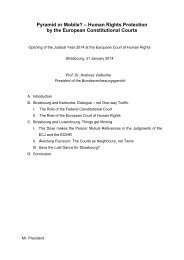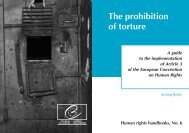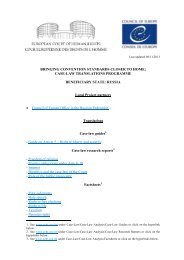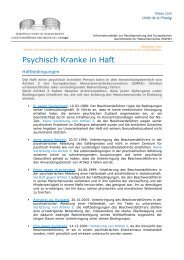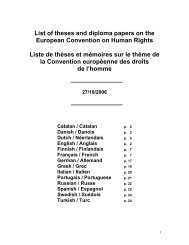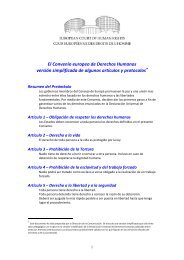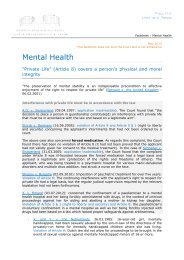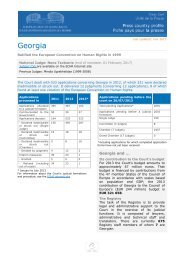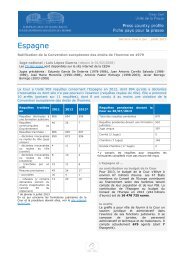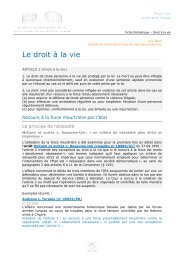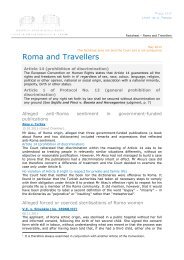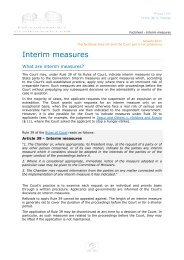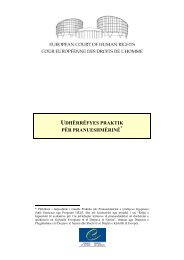The Conscience of Europe - European Court of Human Rights ...
The Conscience of Europe - European Court of Human Rights ...
The Conscience of Europe - European Court of Human Rights ...
You also want an ePaper? Increase the reach of your titles
YUMPU automatically turns print PDFs into web optimized ePapers that Google loves.
DrEss CoDE*<br />
Dear Mr President<br />
<strong>The</strong> <strong>Conscience</strong> <strong>of</strong> <strong>Europe</strong>: 50 Years <strong>of</strong> the <strong>Europe</strong>an <strong>Court</strong> <strong>of</strong> <strong>Human</strong> <strong>Rights</strong> Chapter 4: Current Organization and Procedures<br />
Registry lawyers discussing a case.<br />
23 November 1983<br />
Although with age I have (thank God) become reasonably shockpro<strong>of</strong>,<br />
I must say I have been rather disturbed by the attire <strong>of</strong> applicants’<br />
counsel appearing before us in the Dutch cases. Out <strong>of</strong> three<br />
only one, mercifully, wore a jacket (with a crew-neck pullover<br />
underneath), and one even sported an open checked shirt and blue<br />
jeans reminiscent <strong>of</strong> colourful Arizona. I am myself by no means<br />
an arbiter elegantiarum, but in such an attire as this I would not be<br />
allowed admittance even to my own club.<br />
I understand that the Commission does not allow anyone to<br />
appear before it in such an attire and, quite frankly, I see no<br />
reason why we should do it ourselves. My own feeling is that if<br />
we do not want the <strong>Europe</strong>an <strong>Court</strong> <strong>of</strong> <strong>Human</strong> <strong>Rights</strong> to become<br />
a <strong>Europe</strong>an <strong>Court</strong> <strong>of</strong> Horrid Sights, we must do something about<br />
this before the present occurrence assumes the character <strong>of</strong> a<br />
precedent and the next bunch <strong>of</strong> counsel appear in a jogging suit.<br />
I quite appreciate that we should avoid unpalatable incidents<br />
in open court and I therefore advocate the formulation <strong>of</strong> some<br />
sort <strong>of</strong> rule or directive on the subject which would be known<br />
beforehand to all and sundry.<br />
One does feel a little silly wearing a fur-trimmed blue stole<br />
opposite a member <strong>of</strong> one’s own pr<strong>of</strong>ession wearing blue jeans<br />
and a fancy top. One <strong>of</strong> us has to give in and I am sure it is not us<br />
who should take to wearing fancy tops (maybe with a sheriff’s star)<br />
and blue jeans. It should, if anything, be the other way round.<br />
I understand (this <strong>of</strong> course could be checked) that the rule in the<br />
Hague <strong>Court</strong> is that counsel has to appear before it in the same<br />
attire in which he would appear before his own national court and<br />
I do feel that this is quite a reasonable requirement. Surely it is not<br />
asking too much <strong>of</strong> counsel to expect him to treat us in the same<br />
manner as he would treat his own national court. In any case he<br />
should at least wear a jacket and a tie. Our self-respect demands it.<br />
(<strong>The</strong> name <strong>of</strong> the judge has been withheld.)<br />
About half the Registry’s staff are employed on<br />
contracts <strong>of</strong> unlimited duration and may be expected to<br />
pursue a career in the Registry or in other parts <strong>of</strong> the<br />
Council <strong>of</strong> <strong>Europe</strong>. <strong>The</strong>y are recruited on the basis <strong>of</strong><br />
open competition, and all staff members <strong>of</strong> the Registry<br />
are required to adhere to strict conditions as to their<br />
independence and impartiality.<br />
<strong>The</strong> head <strong>of</strong> the Registry (under the authority <strong>of</strong> the<br />
President <strong>of</strong> the <strong>Court</strong>) is the Registrar, who is elected by<br />
the Plenary <strong>Court</strong>. <strong>The</strong> Registrar is assisted by a Deputy<br />
Registrar, also elected by the Plenary <strong>Court</strong>. Each <strong>of</strong><br />
the <strong>Court</strong>’s five judicial Sections is assisted by a Section<br />
Registrar and a Deputy Section Registrar.<br />
<strong>The</strong> principal function <strong>of</strong> the Registry is to process<br />
and prepare for adjudication applications lodged with<br />
the <strong>Court</strong>. <strong>The</strong> Registry’s lawyers are divided into 32<br />
case-processing divisions, each <strong>of</strong> which is assisted by<br />
an administrative team. <strong>The</strong> lawyers prepare files and<br />
analytical notes for the judges, and they correspond with<br />
the parties on procedural matters. <strong>The</strong>y do not themselves<br />
decide cases. Cases are assigned to the different divisions<br />
on the basis <strong>of</strong> a knowledge <strong>of</strong> the language and legal<br />
system concerned. <strong>The</strong> documents prepared by the<br />
Registry for the <strong>Court</strong> are all drafted in one <strong>of</strong> its two<br />
<strong>of</strong>ficial languages.<br />
In addition to its processing divisions, the Registry<br />
has divisions dealing with the following activities:<br />
ThE CourT b.C. (bEforE CompuTErs)<br />
Although I had been <strong>of</strong>ficially appointed to the <strong>Court</strong>’s service<br />
from 1 February 1981, the Registrar asked me to come in to<br />
familiarize myself with my new duties at the end <strong>of</strong> January,<br />
when there would be a hearing during the <strong>Court</strong>’s session. It<br />
was then that I met for the first time the judges, who in those<br />
days sat for one week in each month in Strasbourg and for the<br />
rest <strong>of</strong> the time went about their business in their respective<br />
countries.<br />
I found the atmosphere friendly on the whole, but on the day<br />
<strong>of</strong> the hearing there was definitely tension in the air. <strong>The</strong><br />
parties and the public pushed forward in a crowd outside the<br />
door to the hearing room under the supervision <strong>of</strong> several<br />
ushers, who appeared to be on a war footing, while the security<br />
arrangements were discreetly managed by a few plain clothes<br />
policemen. Stenographers sat in the courtroom, ready to take<br />
notes <strong>of</strong> the oral argument before dictating them to typists<br />
installed in the library on the ground floor, which had been<br />
turned into a typing pool for the occasion. A special ‘flying<br />
squad’ <strong>of</strong> translators was despatched to empty <strong>of</strong>fices in the<br />
building with the job <strong>of</strong> translating the verbatim record. <strong>The</strong> text<br />
thus gradually took shape in the two <strong>of</strong>ficial languages, and a<br />
few members <strong>of</strong> the Registry – including the legal secretary<br />
dealing with the case – would be standing by to check through<br />
the result until far into the night. Early the following morning the<br />
pro<strong>of</strong>s were at last handed over to the printers, who immediately<br />
ran them <strong>of</strong>f on ancient roneo printers. <strong>The</strong> judges thus had<br />
the verbatim record <strong>of</strong> the hearing in their possession before<br />
they began their deliberations. Calm had returned, the hive had<br />
ceased to buzz and everyone had returned to their normal place<br />
in a more muted atmosphere, some <strong>of</strong> them showing slight<br />
traces <strong>of</strong> fatigue around the eyes.<br />
case management and working methods; information<br />
technology; case-law information and publications;<br />
research and library; just satisfaction; press and public<br />
relations; and internal administration (including a<br />
budget and finance <strong>of</strong>fice). It also has a central <strong>of</strong>fice,<br />
which handles mail, files and archives. <strong>The</strong>re are two<br />
language divisions, whose main work is translating the<br />
<strong>Court</strong>’s judgments into the second <strong>of</strong>ficial language and<br />
verifying the linguistic quality <strong>of</strong> draft judgments before<br />
publication. Although the Convention provides that the<br />
72 73<br />
<strong>The</strong> deliberations took place in private and were minuted. <strong>The</strong><br />
legal secretary in charge <strong>of</strong> the case, assisted by a colleague, took<br />
complete notes <strong>of</strong> the whole discussion, which <strong>of</strong>ten lasted several<br />
hours. When they emerged, exhausted and with aching wrists, the<br />
typing <strong>of</strong> the text began. To my astonishment, each <strong>of</strong> the lawyers<br />
noted the judges’ contributions in only one language and then gave<br />
the result to an assistant working in the appropriate language<br />
to type up. Each assistant left gaps in the part they were typing,<br />
estimating the size as best they could so that a colleague could<br />
later fit in the other contributions. <strong>The</strong> situation could become<br />
comical, because a lot <strong>of</strong> juggling was required to fit, for example,<br />
a contribution in French between two passages in English. <strong>The</strong>re<br />
is no need to point out that this highly confidential document could<br />
only be put together with the help <strong>of</strong> scissors and glue.<br />
My first experience <strong>of</strong> computers was when two computers were<br />
installed on the second floor <strong>of</strong> the <strong>Human</strong> <strong>Rights</strong> Building,<br />
one <strong>of</strong> them in an empty <strong>of</strong>fice and at the disposal <strong>of</strong> the<br />
Commission and the <strong>Court</strong>. One had to watch out for a suitable<br />
moment to be able to use it, and one day when it was free I<br />
decided to type a judgment. <strong>The</strong> afternoon turned stormy, and<br />
one lightning flash later the computer broke down. <strong>The</strong> next day,<br />
once the system had been restored, I was not a little surprised,<br />
on returning to my text, to find that what I had typed in French<br />
the day before was interspersed with Italian words, and it turned<br />
out that my Italian colleague from the Commission had the<br />
same problem – the texts we had typed had become jumbled up<br />
and the word-processed version <strong>of</strong> the Sporrong and Lönnroth v.<br />
Sweden judgment (1982) did not see the light <strong>of</strong> day.<br />
solange Lavenir<br />
Member <strong>of</strong> the Registry <strong>of</strong> the <strong>Court</strong><br />
functions and organization <strong>of</strong> the Registry shall be laid<br />
down in the Rules <strong>of</strong> <strong>Court</strong>, it remains the case that, as<br />
staff members <strong>of</strong> the Council <strong>of</strong> <strong>Europe</strong>, the members <strong>of</strong><br />
the Registry come under the authority <strong>of</strong> the Council’s<br />
Secretary General, who is in turn responsible to the<br />
Committee <strong>of</strong> Ministers, a political body. Whether this<br />
feature should be removed by a revision <strong>of</strong> the status <strong>of</strong><br />
the Registry, making it responsible solely to the judicial<br />
function it serves, is frequently debated, but no consensus<br />
has yet been reached. <strong>The</strong> administrative autonomy <strong>of</strong>



